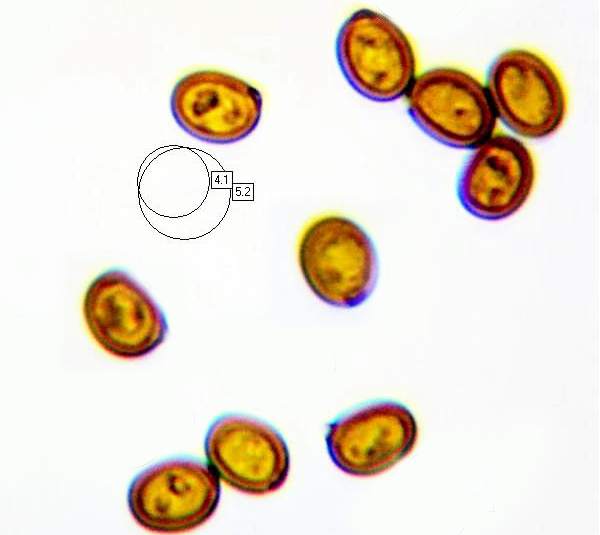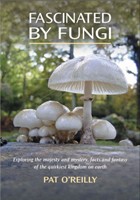Agaricus sylvaticus Schaeff. - Blushing Wood Mushroom
Phylum: Basidiomycota - Class: Agaricomycetes - Order: Agaricales - Family: Agaricaceae
Distribution - Taxonomic History - Etymology - Identification - Culinary Notes - Reference Sources
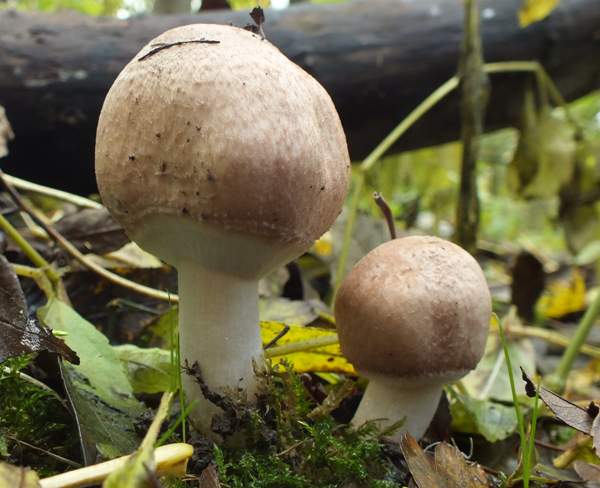
Agaricus sylvaticus is sometimes referred to as the Red Staining Mushroom, because the cap and stipe turn bright red if they are scratched or broken. It is an edible species, although far from common and hence distrusted by many fungi foragers. An alternative spelling Agaricus silvaticus is equally common; this 'orthographic form' is preferred by some authorities. Agaricus sylvaticus is the spelling used on Index Fungorum. At the time of writing the majority of online resources including the British Mycological Society use the form 'silvaticus'.
Several of the Agaricus mushrooms that occur in woodland habitats have flesh that turns slightly red when cut or bruised, but none changes colour as rapidly and easily as the aptly-named Blushing Wood Mushroom.
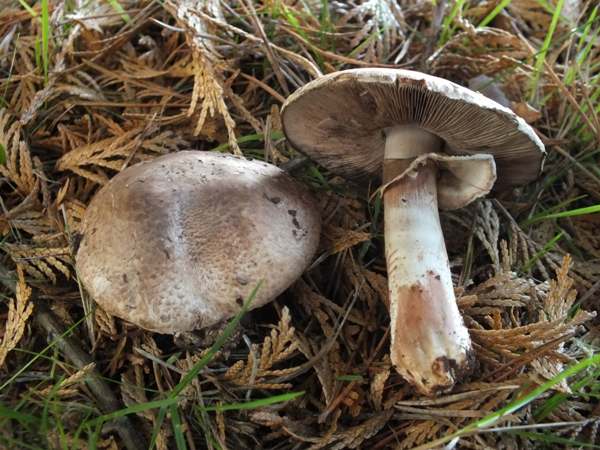
Distribution
A fairly common but localised woodland mushroom in Britain and Ireland, Agaricus sylvaticus occurs also in mainland Europe as well as other regions of the world including parts of North America. The specimens shown on this page were photographed in Wales, UK.
Agaricus sylvaticus is sometimes confused with Agaricus langei, the Scaly Wood Mushroom, which also turns reddish when cut or bruised.
Taxonomic history
In 1762, famous German mycologist Jacob Christian Schaeffer described this mushroom and gave it its currently-accepted scIentific name Agaricus sylvaticus.
Etymology
The specifIc epithet sylvaticus means 'of woods'.
Identification guide
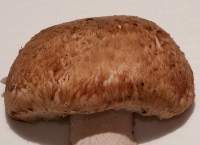 |
CapAgaricus sylvaticus has a cap diameter of 7 to 15cm. Domed at first, the scaly cap expands until it is almost flat. Beneath the surface, which is light russet-brown and covered with reddish-brown scales that are more dense towards the middle of the cap, the flesh is white. Upon cutting the thin, firm cap flesh it turns red and eventually brown. |
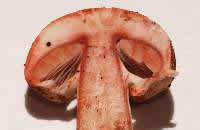 |
GillsInitially pink, the free, crowded gills turn redder and then dark brown as the spores mature. |
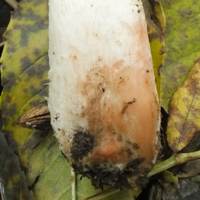 |
StemThe stem, which is 1 to 1.2cm in diameter, is more or less parallel sided above a slightly swollen or bulbous base. When cutor bruised, the solid stem flesh turns red and eventually brown. Above the large, floppy single ring the stem is smooth, while below the ring it is finely scaly. |
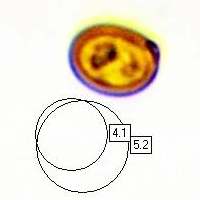 |
SporesOvoid, 4.5-6.5 x 3.2-4.2µm. (The otherwise similar Agaricus langei has much larger spores - an important feature when trying to distinguish between these two 'red-blushing' Agaricus species.) Spore printChocolate brown. |
Odour/taste |
Not distinctive. |
Habitat & Ecological role |
Often in groups in mixed woodland and under trees in parks. |
Season |
August to November in Britain and Ireland. |
Similar species |
Agaricus haemorrhoidarius is very similar (and many authorities consider it to be synonymous), with grey-brown scales and a stouter stem; it occurs also under broad-leaved trees, notably oak and beech. |
Culinary Notes
This large and fairly common woodland mushroom is generally considered a good edible species, and since its flesh turns red rather than yellow when cut it is easy to avoid confusion with the Yellow Stainer Agaricus xanthodermus.
Reference Sources
Fascinated by Fungi, 2nd Edition, Pat O'Reilly 2016, reprinted by Coch-y-bonddu Books in 2022.
BMS List of English Names for Fungi
The genus Agaricus in Britain, 3rd Edition, self-published, Geoffrey Kibby 2011
Funga Nordica: 2nd edition 2012. Edited by Knudsen, H. & Vesterholt, J. ISBN 9788798396130
Dictionary of the Fungi; Paul M. Kirk, Paul F. Cannon, David W. Minter and J. A. Stalpers; CABI, 2008
Taxonomic history and synonym information on these pages is drawn from many sources but in particular from the British Mycological Society's GB Checklist of Fungi.
Acknowledgements
This page includes pictures kindly contributed by Simon Harding and David Kelly.
Fascinated by Fungi. Back by popular demand, Pat O'Reilly's best-selling 450-page hardback book is available now. The latest second edition was republished with a sparkling new cover design in September 2022 by Coch-y-Bonddu Books. Full details and copies are available from the publisher's online bookshop...
